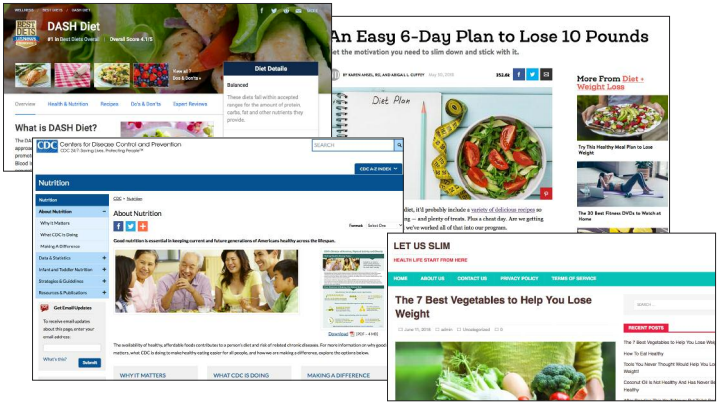Did you know that not everything that you read on the internet is true?
Shocker, I know! So how do you determine the validity of nutrition information on the internet? With so many popular sharing websites like Pinterest and Facebook and even personal blogs and nutrition-dedicated online forums, it seems like anyone can be a nutrition guru. While some of these sites can be helpful while trying to maintain a healthy lifestyle or lose weight, it is important to evaluate whether or not the material you are reading is reliable.
Here are some questions to ask when determining whether or not this information should be trusted.
1. Who runs the website, and what makes them an authority on nutrition?
Do they have schooling or credentials such as RD or MD after their names or are they self-claimed? Many people claim to know a lot about food and diet, but few actually have taken the courses required to make them be considered an expert. Did you know that in many places, a “nutritionist” is not a legally defined term? It simply means a person interested in nutrition. The guy bagging your fries at the drive-thru can call himself a nutritionist if he wanted. As a side note, it is important to always vet your medical professionals. Doctors often don’t take a lot of nutrition courses in school. Depending on specialty, they sometimes can give advice not backed up with scientific evidence, and some are just trying to sell you something. I think we can all recall a certain daytime television doctor that comes to mind. I think another source of misinformation comes from other athletes or fitness industry people, especially in the beautiful grassroots movement that is roller derby. Just because they have a set of rocking abs or kill it on the track every year for the Hydra, doesn’t necessarily mean that they should be giving nutrition advice.
2. Where does this information come from?
Is this information anecdotal or based on an opinion, or is there research to back their claim? I have seen a lot of posts of athletes talking about their diet or how the lack thereof has helped them. This is called anecdotal and isn’t a reliable way to assess information because a lot of other factors come into play that cannot be controlled as in a clinical study or captured like in a longitudinal study. If there is research to support the claim, do they list references? Make sure information is based on scientific facts and check their references to make sure they are reliable. Two quick reliable sources for screening a diet or diet information are cdc.gov/nutrition and health.usnews.com/best-diet.
3. What does the website want from you?
Are they advertising a product or service? Many companies will sponsor a website to promote weight loss products and services. Even some medical professionals or medical offices may be trying to sell a product to you. We have all met that nurse and/or teammate selling a pyramid scheme weight loss product, am I right? Another example would be a weight loss clinic website advertising a certain diet or product rather than individualizing eating plans to your needs.
4. Do they make larger-than-life claims or use emotional wording?
We have all read these lines before: “Drinking lime water will “burn fat”, “Good fat burns bad fat”, and “The grapefruit diet will cause 10 lbs of weight loss in two days.” Remember if it sounds too good to be true, it is.
5. Do they promote an eating plan that is not balanced or eliminates/vilifies one type of food group?
Remember most nutrition experts recommend a diet be balanced and full of fruits and vegetables. JUST BECAUSE A DIET LEADS TO WEIGHT LOSS DOES NOT MEAN IT IS HEALTHY. If any website claims that you must cut out something completely, be wary. Ketogenic, Whole 30, Atkins, and paleo are a couple of examples. Very few studies have been done on diets like these, and the majority of studies often focus on efficacy for weight loss, not health and longterm effects. If you are a little older, you probably remember the low-fat diets of the ‘80s and ‘90s. There is current research starting to be conducted that shows that, those types of diets may have contributed to the surge in Alzheimer’s disease and other neurological disorders. I don’t know about you, but I don’t want to be part of the group that gets to find out what cutting out all carbs from my diet or tripling my protein intake will do to my body in 30 years.
6. Does this information or diet focus on my activity level?
Remember that you are an athlete, and you need to fuel your body like one. Even though some diets like “Medifast” or “ideal protein” are overseen by an M.D., they often require that one does not exercise during them. Super low-calorie diets will definitely influence your performance in training and on the track. If the person you are reading about is not at a similar activity level or activity level is not accounted for at all, you can’t truly evaluate whether this information is relevant to you.
Lastly, know that online information is never a substitute for medical advice. No two people’s bodies work the same, and different medical conditions can affect your macro or micro nutrient needs. If you have any questions about what you hear or read on the internet, get a second opinion. Don’t be afraid to contact a doctor or Registered Dietitian for more nutrition information.
Like what we do? Consider chipping in a few bucks.

